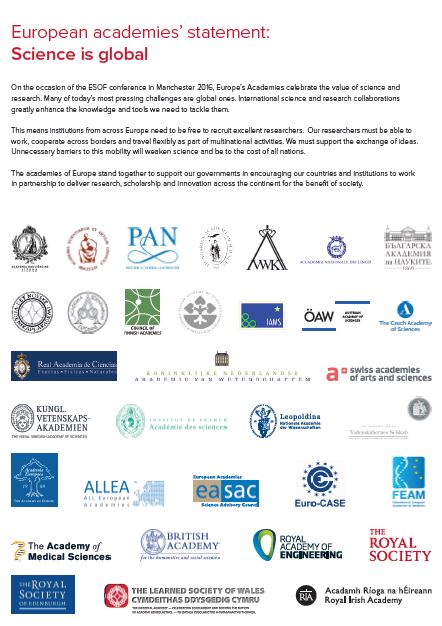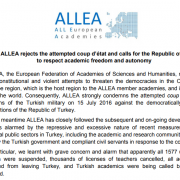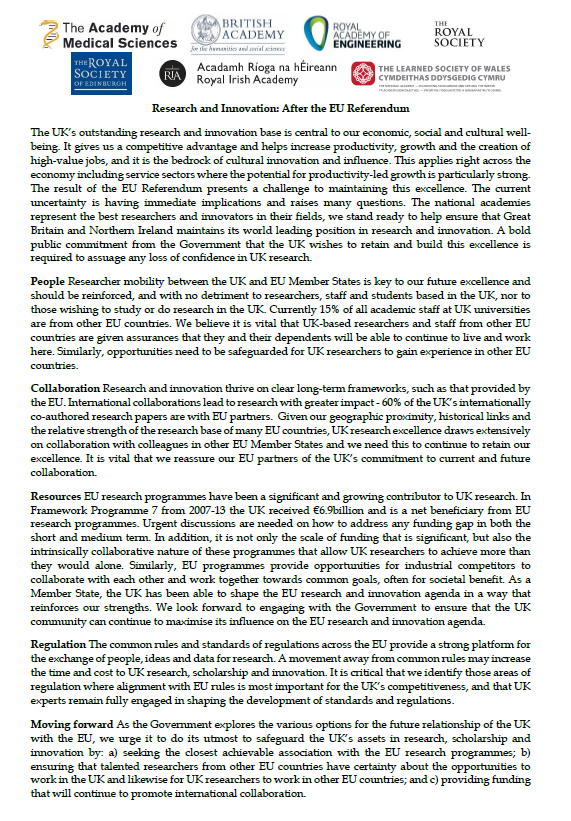ALLEA fully supports the statement “Research and Innovation: after the EU Referendum”, released by seven Academies on the British Isles including five ALLEA Member Academies, and calls upon all parties involved in the Brexit negotiation process to ensure that existing cooperation agreements are not violated and that on-going scientific collaborations and exchanges of researchers continue until the negotiations are finalised and have become legally binding.
The UK’s outstanding research and innovation base is central to our economic, social and cultural well-being. It gives us a competitive advantage and helps increase productivity, growth and the creation of high-value jobs, and it is the bedrock of cultural innovation and influence. This applies right across the economy including service sectors where the potential for productivity-led growth is particularly strong. The result of the EU Referendum presents a challenge to maintaining this excellence. The current uncertainty is having immediate implications and raises many questions. The national academies represent the best researchers and innovators in their fields, we stand ready to help ensure that Great Britain and Northern Ireland maintains its world leading position in research and innovation. A bold public commitment from the Government that the UK wishes to retain and build this excellence is required to assuage any loss of confidence in UK research.
People Researcher mobility between the UK and EU Member States is key to our future excellence and should be reinforced, and with no detriment to researchers, staff and students based in the UK, nor to those wishing to study or do research in the UK. Currently 15% of all academic staff at UK universities are from other EU countries. We believe it is vital that UK-based researchers and staff from other EU countries are given assurances that they and their dependents will be able to continue to live and work here. Similarly, opportunities need to be safeguarded for UK researchers to gain experience in other EU countries.
Collaboration Research and innovation thrive on clear long-term frameworks, such as that provided by the EU. International collaborations lead to research with greater impact – 60% of the UK’s internationally co-authored research papers are with EU partners. Given our geographic proximity, historical links and the relative strength of the research base of many EU countries, UK research excellence draws extensively on collaboration with colleagues in other EU Member States and we need this to continue to retain our excellence. It is vital that we reassure our EU partners of the UK’s commitment to current and future collaboration.
Resources EU research programmes have been a significant and growing contributor to UK research. In Framework Programme 7 from 2007-13 the UK received €6.9billion and is a net beneficiary from EU research programmes. Urgent discussions are needed on how to address any funding gap in both the short and medium term. In addition, it is not only the scale of funding that is significant, but also the intrinsically collaborative nature of these programmes that allow UK researchers to achieve more than they would alone. Similarly, EU programmes provide opportunities for industrial competitors to collaborate with each other and work together towards common goals, often for societal benefit. As a Member State, the UK has been able to shape the EU research and innovation agenda in a way that reinforces our strengths. We look forward to engaging with the Government to ensure that the UK community can continue to maximise its influence on the EU research and innovation agenda.
Regulation The common rules and standards of regulations across the EU provide a strong platform for the exchange of people, ideas and data for research. A movement away from common rules may increase the time and cost to UK research, scholarship and innovation. It is critical that we identify those areas of regulation where alignment with EU rules is most important for the UK’s competitiveness, and that UK experts remain fully engaged in shaping the development of standards and regulations.
Moving forward As the Government explores the various options for the future relationship of the UK with the EU, we urge it to do its utmost to safeguard the UK’s assets in research, scholarship and innovation by: a) seeking the closest achievable association with the EU research programmes; b) ensuring that talented researchers from other EU countries have certainty about the opportunities to work in the UK and likewise for UK researchers to work in other EU countries; and c) providing funding that will continue to promote international collaboration.
Click here for pdf version of the statement





